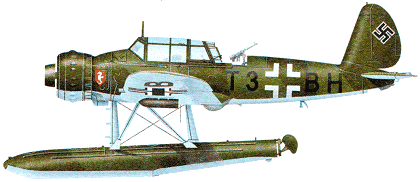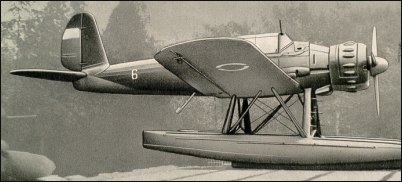|
| The Ar.196 monoplane was a development of the Ar.95 and the first prototype flew in 1938. Following a number of pre-production aircraft, production proper began with twenty Ar.196A-1, which were delivered from mid-1939. Production continued with A-2 to A-5 versions and a few modified single-float Ar.196B, the number of aircraft produced totalling about 435. Ar.196 seaplanes were operational with the German Navy in reconnaissance, patrol and anti-submarine roles throughout World War II and were for many years the standard catapult sea-plane of the Navy, up to four being carried on board some battleships.

| CREW | 2 |
| ENGINE | 1 x BMW 132K, 705kW |
| WEIGHTS |
| Take-off weight | 3600 kg | 7937 lb |
| Empty weight | 1265 kg | 2789 lb |
| DIMENSIONS |
| Wingspan | 12.4 m | 41 ft 8 in |
| Length | 11.0 m | 36 ft 1 in |
| Height | 4.5 m | 15 ft 9 in |
| Wing area | 28.3 m2 | 304.62 sq ft |
| PERFORMANCE |
| Max. speed | 315 km/h | 196 mph |
| Cruise speed | 268 km/h | 167 mph |
| Ceiling | 6600 m | 21650 ft |
| Range w/max.fuel | 1080 km | 671 miles |
| Range w/max payload | 820 km | 510 miles |
| ARMAMENT | 2-3 machine-guns, cannon, 100kg of bombs |
 | A three-view drawing (800 x 520) |
| Barry, 17.01.2013 15:42 Including those manufactured by SNCA in St Nazaire France, and those by Fokker in Amsterdam total production was 593 aircraft. The Luftwaffe Bordfliegerstaffeln were tasked with providing reconnaissance aircraft for the Kriegsmarine and so it was that the Ar196 beat the Fw62 in the competition to fulfill this role. The Ar 196 was to be found on German capital ships such as the "Admiral Graff Spee", "Admiral Scheer" and the "Deutchland" to name but three. The first notable use was on aboard the Graff Spee which was scuttled in Montevideo harbour after being trapped there by a Royal Navy cruiser squadron in the famous Battle of the River Plate. One example was captured and sent to the Marine Aircraft Experimental Establishment at Helensburg after the capture of the "Admiral Hipper" in Norway. The Ar196 was also used by Bulgaria (as already noted) Finland and Rumania. reply | | Ernie Ford, e-mail, 05.12.2011 12:46 While I was in the army in Germany 1952 a German mechanic told me he had been in the navy based in Boulogne during 1940. He said an Arado rescue seaplane bearing white markings had been shot up by a Brit plane while rescuing a downed airman. He said, "why would they do that? It picked up your airmen as well." Recently it was mentioned in a documentary on tv. I just wondered what model it would have been as those for the time seem to be single seaters. reply | | jmvs, e-mail, 12.07.2011 01:50 O couraçado Bismark levava 4 desses aviões abordo para reconhecimento. reply | | Gerhard Katz, e-mail, 04.03.2011 18:06 This Arado-Model could not carry a torpedo, only the armament listed above.
In detail: 1x7,92mm MG 15, 1x7,92 MG 17
2x20mm MG FF, 2xBomb 50 kg. reply | |
| | Ron Patten, e-mail, 05.07.2010 22:28 I'm looking for a set of drawings that I can use to build a model with. reply | | Michael Totoris, e-mail, 17.04.2010 19:01 Couldn't this plane also carry a torpedo? reply | | Baron von Peterhoven, e-mail, 01.03.2008 14:06 This is a blueprint in bulgarian markings reply | | juliy hristov, e-mail, 28.05.2007 01:51 This aircraft on the pictures is with bulgarian cocard.We use them until 1955.The last one wos in navy museum in my home town Varna. Now from mid 90"s it is in aviation museum in Plovdiv. reply |
|
Do you have any comments?
|
| 
COMPANY
PROFILE
All the World's Rotorcraft
|








